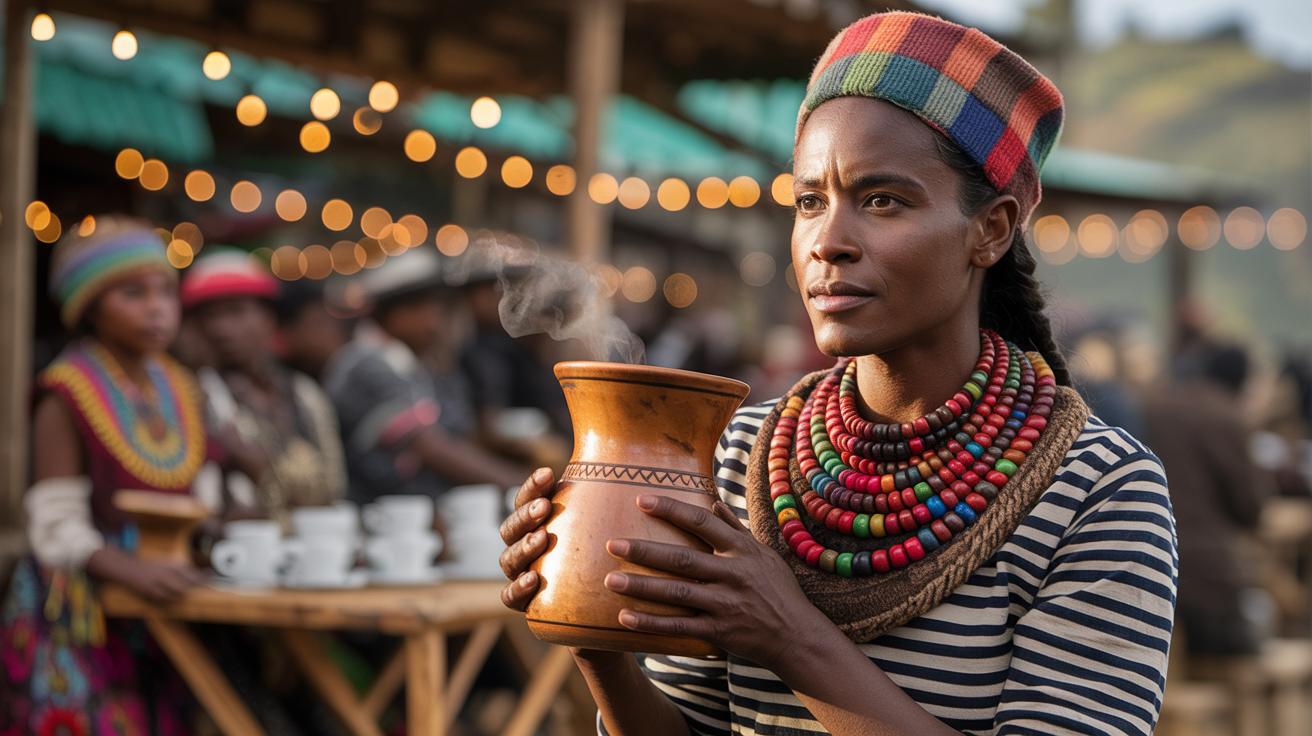What You Need to Know
- ☕ Coffee’s Legendary Origins: Discover the mythical tale of Kaldi, the Ethiopian goatherd who stumbled upon coffee’s energizing effects.
- 🌍 Global Cultural Significance: Explore how coffee rituals, from Ethiopian ceremonies to Turkish traditions, underscore its spiritual and communal importance.
- 🍽️ Unique Flavors Worldwide: Experience diverse coffee innovations such as Finland’s “coffee cheese” and Vietnam’s egg coffee.
- 📜 Historical Impact and Colonial Expansion: Learn how coffee fueled empires and revolutions, shaping global trade and cultural exchanges.
- 🏛️ Cafes as Cultural Hubs: Uncover the role of cafes as centers for intellectual thought, social movements, and modern-day community engagement.
Coffee, more than just a cherished morning ritual, is a global phenomenon that connects cultures and histories across the world. Its journey from mystical origins to a commodity with revolutionary influence is as rich and varied as its flavors. Today, coffee is not only a staple beverage but also a cultural symbol and an economic powerhouse. As climate change impacts its production, the tale of coffee continues to evolve, reflecting both the challenges and the enduring allure of this beloved brew. Let us explore its fascinating journey through time and across continents.
Mythical Origins and Spiritual Significance
The story of coffee begins with the legend of an Ethiopian goatherd named Kaldi, who discovered the energizing effects of coffee berries after observing his goats’ unusual behavior. While this tale may be more myth than fact, it underscores the deep-rooted significance of coffee in Ethiopian culture. The Arabica variety, native to Ethiopia’s Kaffa region, plays a crucial role in traditional ceremonies, where beans are roasted over an open flame and brewed in a clay “jebena.”
In Senegal, “cafe Touba” is infused with Guinea pepper and cloves, originating from Islamic Sufi traditions. This beverage is not merely a drink but a spiritual practice, underscoring the profound connection between coffee and spirituality. Similarly, Turkey’s unfiltered coffee, brewed in a copper “cezve,” is steeped in tradition, often accompanied by fortune-telling from leftover grounds, a cherished ritual even among Turkey’s younger generations.
Unique Flavors Across the Globe
Coffee’s adaptability is evident in the diverse and inventive ways it is consumed around the world. In Nordic countries like Finland and Sweden, coffee is sometimes poured over cubes of “kaffeost,” or coffee cheese, made from cow or reindeer milk, creating a unique flavor profile. Meanwhile, in Vietnam, the famous ca phe trung, or egg coffee, combines whipped egg yolk with sweetened condensed milk, a wartime improvisation that has become a beloved staple.
Indonesia’s “kopi luwak”, often referred to as the “Holy Grail of Coffees,” is made from partially digested beans eaten and defecated by the Asian palm civet. While prized for its smooth, fermented flavor, the production of kopi luwak has raised ethical concerns due to the treatment of civets. Efforts to promote “wild-sourced” versions are ongoing, though third-party verification remains inconsistent.
The Global Spread and Colonial Impact
Coffee’s journey from Ethiopia to the rest of the world is a story of trade, spirituality, and imperial ambition. The earliest written evidence of coffee cultivation comes from Yemen, where it earned the Arabic term “qahwa,” meaning wine. This term evolved into the words coffee and cafe. Sufi mystics in Yemen drank coffee to maintain spiritual focus during long chants, and the port of Mocha became a hub for coffee trade, spreading its influence across the Islamic world and into Asia.
European colonial powers quickly recognized the potential of coffee. The Dutch introduced it to Java, the French to the Caribbean, and the Portuguese to Brazil, each expansion driven by empire and built on the labor of enslaved people. Brazil, introduced to coffee in the 1700s, grew to become the world’s largest producer. Even Australia developed a robust coffee culture, with both Australia and New Zealand claiming the invention of the flat white in the 1980s.
Cafes as Centers of Culture and Revolution
Throughout history, cafes have been more than just places to enjoy a cup of coffee; they have been centers of social change and intellectual exchange. In 16th-century Istanbul, authorities attempted to ban cafes, fearing that the gatherings they hosted could spark unrest. During the Enlightenment, European cafes became hotbeds of radical thought, frequented by thinkers like Voltaire and Rousseau.
In colonial America, coffee emerged as a patriotic alternative to British-taxed tea. Boston’s Green Dragon Tavern, known as the “Headquarters of the Revolution,” hosted meetings of the Sons of Liberty, activists who organized resistance against British rule. In modern times, cafes have evolved into “third places,” offering a space between home and work. From providing public internet access to unique experiences like cat cafes, coffeehouses continue to adapt, offering solace and connection in an increasingly fast-paced world.
Coffee’s story is one of transformation, from a sacred brew to a global commodity, each cup offering a taste of history and culture. As climate change threatens its production, the future of coffee remains uncertain. How will this beloved beverage continue to shape and be shaped by the world? How might future generations redefine coffee culture in response to these challenges?
Did you like it?4.6/5 (23)







6 comments
sofia
Are there any modern-day revolutions being brewed in cafes today? It’d be interesting to see coffeehouses as centers of change once again.
luis
This post made me appreciate my morning coffee even more! Thanks for enlightening us on its cultural significance and history. 😊
scarlett
I’m curious about the ethical concerns surrounding kopi luwak. How can we ensure it’s sourced responsibly?
hunter
Egg coffee in Vietnam sounds intriguing, but isn’t it a bit too adventurous for breakfast? 😂
nathanphoenix
Did Kaldi really discover coffee through his goats, or is it just a legend? Either way, it makes for a great story! 🐐
valeria
Wow, I had no idea coffee had such a rich history! Thanks for sharing this fascinating journey from its mythical origins to its global influence. ☕️